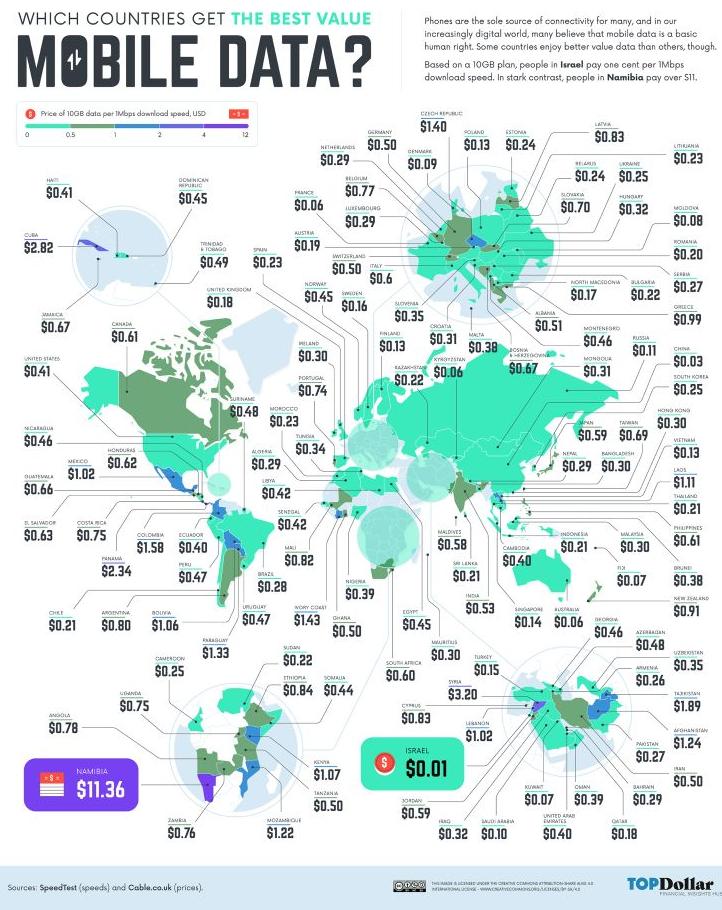There are around 3.8 billion smartphone users in the world. That equates to almost 50 percent of the global population. And all of them want cheap and fast data.
 By what countries around the globe offer the best-priced data packages? And where are people paying more for their data? Researchers from Top Dollar decided to investigate. Using data collected from the World Bank and other credible sources, they created a series of infographics on global mobile data charges.
By what countries around the globe offer the best-priced data packages? And where are people paying more for their data? Researchers from Top Dollar decided to investigate. Using data collected from the World Bank and other credible sources, they created a series of infographics on global mobile data charges.
Where data comes cheap
Israel has the cheapest data in the world, according to Top Dollar researchers. Based on a standard 10GB monthly plan, mobile users in Israel pay just $0.01 per 1Mbps download speed. The low prices are mainly due to a highly competitive mobile data market, which includes a large customer base for providers. Over 95 percent of Israelis have instant access to the internet.
China ranks second, with 10GB data per 1Mbps download speed costing $0.003. Again, China’s ability to keep the cost of data down stems from its vast digital infrastructure network. And more innovation is on the way. Earlier this year Chinese officials opened the Future Internet Test Infrastructure (FITI) center – the world’s largest internet and data test facility. Analysts believe this will lead to a wave of revolutions in the digital space, including faster (and even cheaper data) for Chinese citizens.
Other countries where fast data costs less than $0.10 include Italy, Australia, France, Denmark, Moldova, and Kuwait. And despite Fiji’s remote location in the middle of the South Pacific Ocean, its telecom companies still provide fast and well-priced data to all the islanders. Fijians pay $0.07 for 10GB data per 1Mbps download speed, although you might struggle to pick up a few bars if you go trekking through the island’s mountainous regions.
Where people pay the most for their data
Data is expensive in Namibia. Based on the Top Dollar metrics, Namibians pay a whopping $11.36 per 1Mbps download speed. That makes Namibia the most expensive place in the world for data. The high costs are a direct result of Namibia’s undeveloped infrastructure. Namibians living in rural areas are stuck using 2G devices and technology. Those in the cities and larger towns have it a little better, but their overpriced 3G networks still run at a snail’s pace.
Namibia isn’t the only developing nation where mobile data is expensive and slow. In fact, there’s a direct correlation between a lack of infrastructure and high data prices. Cuba, Tajikistan, Colombia, and Ivory Coast are four more developing countries that make up the list of the most expensive places on earth for mobile data. With prices ranging from $1.43 to $2.82 per 1Mbps download speed, citizens in these countries pay up to 300 percent more for data when compared to people living in developed nations.
Other countries on the list are struggling to build robust digital infrastructure networks due to years of war and conflict. As such, the people in war torn Syria and Afghanistan are still denied access to reliable and cheap data. Syrians pay $3.20 per 1Mbps download speed; Afghans are forced to pay $1.24.
The inclusion of the Czech Republic may surprise some people. After all, the Eastern European nation is a middle-income economy with above-average digital infrastructure and network coverage. But the nation’s mobile industry is dominated by a small group of providers that operate like a cartel. And this lack of free and fair competition keeps prices high ($1.40). What’s more, Czechs shouldn’t expect much help from their political leaders in creating a fairer telecoms industry. When challenged about high mobile tariffs, the Czech Industry and Trade Minister Lubomir Bokstefl said that any customers looking for cheaper deals should go to Poland.
The real value of affordable data
Affordable data and reliable mobile networks are great for binging on cat videos or watching your favorite Netflix series to block out the horror of a Monday morning commute. But for those in developing countries, fair-priced data means so much more. It’s a chance to learn, participate in local and international markets, and keep rogue governments and organizations in check. In other words, access to cheap data equals freedom and opportunity. And, unfortunately, there’s still a long way to go in addressing the existing price inequalities across the globe.





